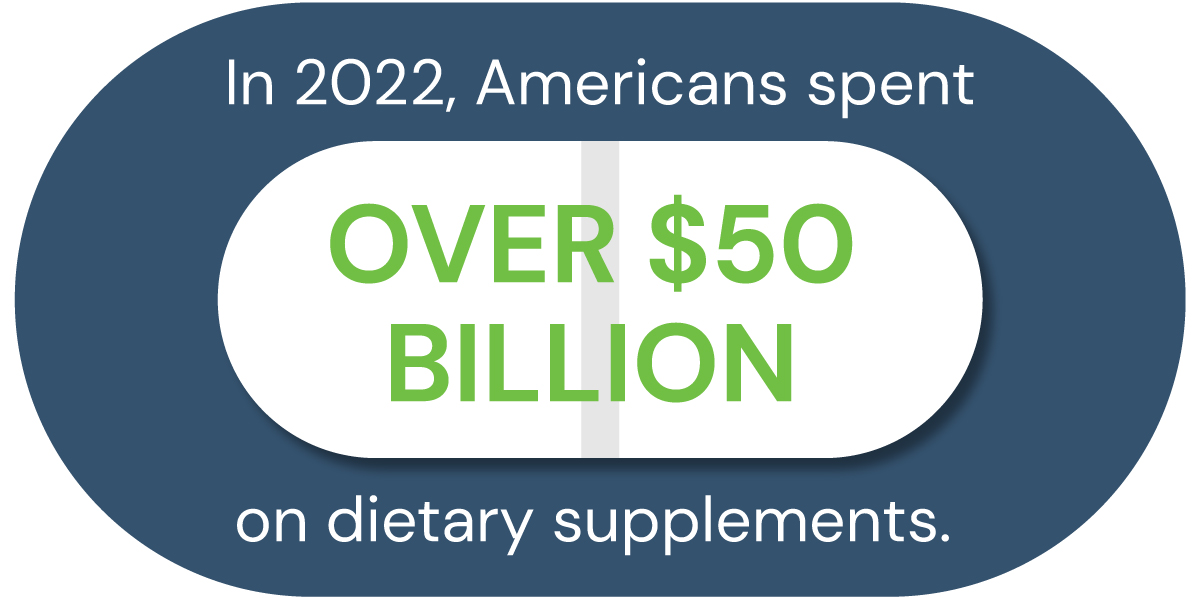
June 26, 2023
Take a stroll down your grocery store’s pharmaceutical aisle and you’re sure to see them. Hundreds of bottles of dietary supplements—vitamins, minerals, herbs and amino acids—line the shelves at most grocery stores, convenience stores and even online storefronts, and they’re there for good reason. Americans spent almost $50 billion on dietary supplements in 2021! For those suffering from knee aches and pains, many vitamin brands use ingredients like Glucosamine and claim their supplements improve bone or joint health and can help reduce discomfort. But before you add supplements like vitamins to your own cart for knee pain, it’s important to know if they actually reduce knee pain.

Many people claim dietary supplements can help strengthen bones, joints or muscles. A lack of strength in these parts of the body often contributes to common knee problems you might suffer from.
According to Dr. Lance Ellis, a board certified orthopedic surgeon at Coryell Health who works with patients suffering from joint pain, the most common knee issues he sees can range from “osteoarthritis to meniscus cartilage injuries to knee sprains and more serious fractures, depending on the patient’s age and the casuse of the issue.”
Based on his experience treating patients, Dr. Ellis knows that joint health vitamins including vitamin D, C and E are popular supplements. The question is, do they actually help with common knee problems? Dr. Ellis explained that they can.
“They’re essential for maintaining strong bones and health joints, and the anti-inflammatory properties of these vitamins can help prevent joint damage,” said Dr. Ellis.
There are a couple of lesser-known vitamins that Dr. Ellis often recommends to patients with joint pain and osteoarthritis: glucosamine and chondroitin. Both supplements have been shown to reduce inflammation, promote cartilage growth and improve joint function, making them a valuable addition to any joint health regimen.
Naturally occurring vitamins help your body promote healthy bones and bone density, but supplements are not the end-all-be-all of staying healthy. If you’re looking to prevent knee problems or manage your pain at home, here’s what Dr. Ellis suggests:
“Maintain a healthy diet and engage in regular exercise to promote overall joint health and a healthy weight. Low-impact exercises such as swimming, yoga and cycling can be particularly beneficial for those looking to protect their knees from injury.”
While surgery may be necessary in some cases, there are a few at-home remedies that might be effective in helping you manage pain, including exercises that strengthen the muscles around the knee, hot and cold therapy and over-the-counter pain relievers.

What Are Vitamins?
Vitamins are nutrients the human body needs to function healthily. Your body only needs small amounts of vitamins and minerals, and most people obtain all their vitamins from their day-to-day diet if they’re consuming balanced meals. Some people might have vitamin deficiencies or aren’t meeting their body’s needs through their regular diet. For these people, vitamins provide convenient doses of important nutrients their bodies may be missing.
If you’re taking vitamins or looking to add them to your diet to manage knee pain, Coryell Health physicians can recommend relief beyond supplements. Give us a call at (254) 865-2166 to start on the path to overall health and wellness.
 Skip to content
Skip to content
